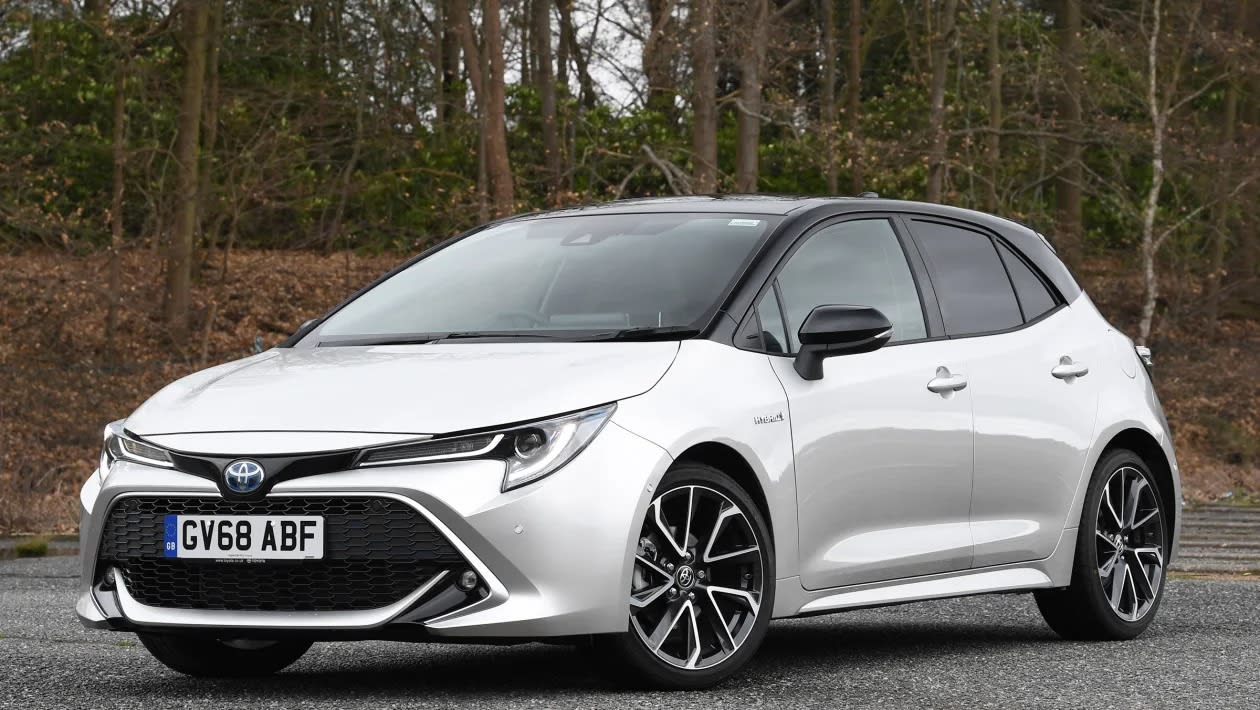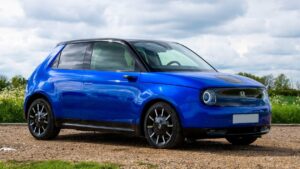
Verdict
While the Corolla has a reputation for being bland, Toyota has raised its game in recent years. Its cars are more interesting to look at as well as being more engaging to drive. This is typified by the Corolla, which scooped the Affordable Hybrid of the Year award in our 2019 honours, just a few months before DrivingElectric announced that the Corolla Touring Sports was its Best Medium Hybrid Car.
In 2020 CarBuyer named the Corolla its Best Company Car. Those awards were given because of the Toyota’s low running costs, generous equipment, refinement and engaging dynamics. As you’d expect, three years on the Corolla can add decent reliability to that list, making this a car that’s not just easy to own, but one that’s also enjoyable.
When Toyota arrived in the UK in the mid-sixties, the Corolla was one of its core products, and almost six decades later, the model is still being sold. While only the name remains, with more than 50 million Corollas have found homes so far, you can’t blame the firm for sticking with one of the world’s most familiar automotive monikers.
Corollas have been sold continuously around the world for more than 50 years, but in the UK the Auris took over for a while. That was a capable car which was ultimately rather uninspiring, and when the Corolla picked up the baton once more it was just what buyers wanted, with the Mk12 version representing a big leap over the Auris.
History
The 12th-generation Corolla arrived in spring 2019 with a choice of three engines: a 114bhp turbocharged 1.2-litre petrol unit with a manual gearbox, alongside a 120bhp 1.8 and 178bhp 2.0-litre hybrids that were both fitted with a continuously variable automatic transmission.
More reviews
Car group tests
In-depth reviews
Road tests
These initially came with a choice of five-door hatchback or Touring Sports estate body styles, but almost immediately, a four-door saloon joined the range, sold only with the 1.8 hybrid powertrain. The 1.2T petrol engine was dropped in December 2019, when Toyota expanded the Corolla range with a Trek edition (in estate form only), and the GR Sport in hatchback and Touring Sports guises, with 1.8 or 2.0-litre hybrid engines. A few tweaks in January 2022 brought improved infotainment with voice control, extra exterior colour options, and a limited-edition Trek Touring Sports.
Which one should I buy?
Only you can decide which body style suits you best, and you’ll almost certainly buy a Corolla hybrid; the 2.0 litre is noticeably more perky than the 1.8, but the latter is much more common.
All models are well equipped, with the entry-level Icon featuring 16-inch alloys, dual-zone climate control, LED headlights, heated front and outer rear seats, a reversing camera, an eight-inch touchscreen display and adaptive cruise control.
Icon Tech adds navigation, front and rear parking sensors plus voice recognition, while Design also brings 17-inch wheels, electrically folding door mirrors, automatic wipers, ambient lighting and privacy glass. The GR Sport has 18-inch rims, part-leather trim and a head-up display. The Trek adds a powered tailgate and keyless go, while the range-topping Excel features leather trim.
Alternatives to the Toyota Corolla
The small family hatchback sector is fiercely competitive. One of the most appealing options is the Volkswagen Golf, with a wide model range that includes petrol, diesel and plug-in hybrid powertrains. It’s also user-friendly, tough and good to drive. Related to the VW are the SEAT Leon, Audi A3 and Skoda Octavia, which share the same attributes.
Ford’s Focus and Vauxhall’s Astra are plentiful and good value for money. The Kia Ceed and Hyundai i30 are keenly priced, well equipped and have long warranties, while the Peugeot 308 looks smart, has an impressive interior and is dynamically very capable, just like the Mazda 3. Also worth considering is the Honda Civic, along with the BMW 1 Series and Mercedes A-Class.
What to look for
Racy
The GR Sport looks more sporty than the regular Corolla, but it’s mechanically the same as the other models in the range.
Towing
If you’re buying to tow, go for a 1.2 turbo, which can pull up to 1,300kg. Buy a 1.8 or 2.0 hybrid and the limit is 750kg, regardless of body style.
Power
The 2.0 hybrid has a larger battery than the 1.8, and a more powerful electric motor. Performance is noticeably stronger, but boot space is reduced.
Spare
The 2.0 hybrid Design with optional panoramic roof also adds a spare wheel. A space saver was optional for all models except the top-spec Excel.
Common faults
Toyota has a great reputation for reliability; only 16.15 per cent of owners reported faults in our Driver Power 2022 brands survey, which was below average for the entire manufacturer survey. The Corolla itself achieved an above-average score for reliability in the new-car section of our poll, too.
Interior
The Corolla’s dashboard design is appealing enough, just like the general fit and finish throughout the Toyota’s cabin, but what lets it down is the outdated graphics for the infotainment system. Toyota improved the set-up in spring 2020, so a later car is worth seeking out.
Seat comfort up front is good, but rear headroom is tighter for tall people and it’s not as though the boot is huge to compensate. The hatchback can stow 361 or 1,052 litres (313 or 1,004 for the 2.0); equivalent figures for the estate are 581 and 1,606 litres (rear seats up and folded).
Running costs
All Corollas need to be serviced every 12 months or 10,000 miles. Maintenance alternates between minor and major, priced at £230 and £350. A separate hybrid health check is available for £45, but is included in the major service. Also included within the major service is fresh brake fluid every other year, along with new coolant when it’s needed; there’s no set schedule for the latter.
The fitment of a timing chain to all engines means that there’s no cambelt to replace, while all official dealers offer service plans. The standard warranty is five years or 100,000 miles (or 3yrs/60k miles for cars registered from 1 June 2021), and each time an official dealer services your car, an extra 12 months’ warranty is included, up to 10 years. The hybrid battery pack cover can be extended to up to 15 years.
Recalls
This generation of Corolla has been recalled three times so far. The first action was in May 2019, because the eCall system hadn’t been activated on 3,484 Corollas and RAV4s made between October 2018 and April 2019. A software update was all that was needed.
The deflector for the panoramic roof was not secured properly on 19 Corollas made in January and February 2019, and this led to a recall in June of that year.
Toyota’s most recent campaign was launched two years later, in June 2021. This was because of potential problems with the high-pressure fuel pump, which could be damaged over time. All of the models involved were built up to October 2019, with 5,440 cars affected in all, including some Aurises and C-HRs. The solution to the problem was to fit a new fuel pump.
Driver Power owner satisfaction
The Corolla Mk12 made its Driver Power debut in our 2020 new-car survey, when it came seventh out of 75. Within a year it had dropped to 32nd, then 38th in 2022. It was ahead of the Vauxhall Astra and VW Golf, but behind the Kia Ceed Mk3 and SEAT Leon Mk3. Corolla owners like the driving experience, fuel economy and overall quality, but not the exterior finish, all-round visibility or rear-seat legroom.
Looking to sell your current car quickly and for a good price? Or looking for a reliable used car, check out our showroom
You may also be interested in…

Headlight glare on UK roads to be measured
Car headlight glare on UK roads is to be measured by research company TRL has been commissioned by the government’s Department of Transport

CO2 emissions from UK car production halved since 1999
UK car production CO2 emissions halved Manufacturing your new car uses roughly the same amount of energy as the average household uses in electricity

Used Honda e (Mk1, 2020-2024) Review: desirable city EV
Ever since Honda launched its first model in the early sixties, it has been one of the world’s most innovative car brands. What do we
